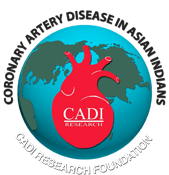Overview
- A risk factor is any bodily condition or personal behavior that increases the chance of your developing some particular disease. The concept of a cardiovascular risk factor—things that increase your odds of developing heart disease or a stroke, or both—were developed from the Framingham Heart Study more than 50 years ago.1
- This landmark study initially identified three major cardiac risk factors: high cholesterol, high blood pressure, and smoking. Since then, the medical community has refined its understanding of cardiac risk even further, and other epidemiological studies in the US and Europe have now identified several traditional and nontraditional risk factors.2 The greater the number or the severity of your risk factors, the more likely it is that you will develop cardiovascular disease.3
|
Table 120 A. Nine Universal risk factors for Heart Attack in the order of importance in the INTERHEART Study4 |
|
|
|
|
|
|
|
|
|
|
|
|
|
|
|
|
|
|
|
- Although scientists have identified more than 300 risk factors, there is no need to panic: You only need to know fewer than a dozen of them to live a healthful life! Essentially, there are just a handful of critical lifestyle choices to which you need to pay particularly careful attention to sharply cut down your chances of developing cardiovascular disease.2
- Current evidence suggests that most significant risk factors for heart disease have been identified. High cholesterol, high blood pressure and tobacco use remain the three most important risk factors and are addressed in detail elsewhere. The various risk factors lay a foundation for future heart attacks or other cardiac complications.
- In 2004 Dr. Salim Yusuf, director of the Population Research Institute at Canada’s McMaster University and a world-renowned Indian cardiologist-scientist, reported on the results of the INTER-HEART Study, the largest-ever heart attack study undertaken. Involving more than 29,000 people from 52 countries, this multi-center, international study has identified nine controllable risk factors that account for more than nine out of ten of all heart attacks in the world.4
- What is particularly interesting is that these nine factors strongly predict heart attacks for every ethnic group in every part of the world. They are “universal.” In order of importance, the nine risk factors are given in Table 120-A. Abnormal cholesterol levels and tobacco use each increase the risk 3 fold, but together these 2 risk factors account for 85% of all heart attacks.4
1. Is there a relationship between erectile dysfunction (ED) and heart disease?
A. A meta-analysis of prospective cohort studies done till 2011 suggests that ED significantly increases the risk of coronary heart disease (46%), stroke (39%), and all-cause mortality (19%). This increase is probably independent of conventional cardiovascular risk factors.
Possible explanation include artery size hypothesis. Because atherosclerosis affects all vascular beds and possibly affects penile artery earlier than coronary arteries by the same size of plaque, because of the smaller size of penile arteries. Another explanation is endothelial dysfunction without plaque build-up.5
2.What is the relationship between ED and depression?
A. Men with ED have greater depression and depressed men have greater ED. Depression may offer another explanation for the increased risk of heart disease in men with ED.5
Sources
1. Kannel W.B, D’Agostino RB, Sullivan L, Wilson PW. Concept and usefulness of cardiovascular risk profiles. Am Heart J. Jul 2004;148(1):16-26.
2. Enas EA. How to Beat the Heart Disease Epidemic among South Asians: A Prevention and Management Guide for Asian Indians and their Doctors. Downers Grove: Advanced Heart Lipid Clinic USA; 2011.
3. Enas EA. Lipoprotein(a) is an important genetic risk factor for coronary artery disease in Asian Indians. Am J Cardiol. 2001;88:201-202.
4. Yusuf S, Hawken S, Ounpuu S, et al. Effect of potentially modifiable risk factors associated with myocardial infarction in 52 countries (the INTERHEART study): case-control study. Lancet. Sep 11 2004;364(9438):937-952.
5. Dong JY, Zhang YH, Qin LQ. Erectile dysfunction and risk of cardiovascular disease: meta-analysis of prospective cohort studies. J Am Coll Cardiol. Sep 20 2011;58(13):1378-1385.
6. https://viaqx.com/. Best Erectile Dysfunction pills for Men's sexual Health.

